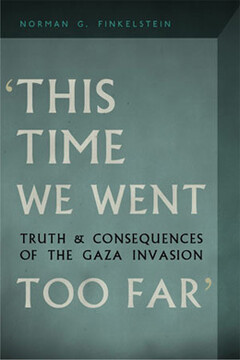The Electronic Intifada 15 April 2009

Benjamin Netanyahu’s promise of “economic peace” means the beginning of a new stage of colonization. (Moti Milrod/MaanImages)
The Israelis have offered the Palestinians many types of “peace.” Their first attempt to reach out to the Palestinians was in 1948 with an offer of a “racist peace.” Ethnic cleansing was the basis of a “racist peace” where Zionist terrorists drove out two thirds of the Palestinian population from their homes. Its logic was that expulsion would end strife between Zionists and Palestinians (by eliminating one side) enabling the Zionists to enjoy peace in an ethnic Jewish haven. The Palestinians, stubborn as they were, refused a racist Zionist state as the basis for “peace.”
Israel relentlessly extended its hand to the Palestinians offering them a “military peace” instead. Deterrence was the basis of a “military peace” where a Zionist state armed to the teeth would instill fear in the hearts of the Palestinians. Its logic was that through military deterrence the Palestinians would accept their condition of displacement. Soon after their expulsion in 1948, Palestinian refugees continuously attempted to return to their properties. The Zionists initiated a campaign of reprisals to deny their right to return. Hundreds were killed in this way, massacres included Qibya in 1953, Lebanon in 1982, Jenin in 2002 and Gaza in 2009. Palestinians however rejected Zionist military domination as the basis for “peace.”
While the above two peace offers were crude, Israel devised an “apartheid peace” as a more elaborate proposal to the Palestinians, hoping they would finally reciprocate. Physical separation between Jews and Arab Palestinians was the basis for an “apartheid peace.” Its logic was that the Palestinians would be given limited autonomy to manage their internal affairs and build their own institutions but their demands would have to eventually fall short of full sovereignty. Some Palestinians were co-opted in signing the Oslo accords in 1993, accepting apartheid as the basis for “peace.”
During the following years, Israel consolidated its vision for an “apartheid peace,” generously referred to as a “two-state solution.” More land was taken from the Palestinians for building of Jewish-only colonies and Jewish-only roads, fragmenting the territories. House demolitions cleared unwanted Palestinians from certain areas and a wall was built to encircle the ghettos. Israel’s “peace” offensive divided the Palestinians into those who accepted Israel’s apartheid, namely the Palestinian Collaborationist Authority in Ramallah, and those who refuse to subordinate their most basic rights to Israel’s racism.
In the latest peace overture, the new Israeli prime minister, Benjamin Netanyahu promised the Palestinians “economic peace,” this time literally. Previous Israeli governments have used the economy to pacify the Palestinians and allure them with short-term individualist and materialist gains. Netanyahu however is astute and understands that the circumstances today are different than in the 1970s or 1990s. He has even more enthusiastic support from the Palestinian side and the international community.
Since taking office, Salam Fayyad, the unelected prime minister of the Palestinian Collaborationist Authority, has worked with Quartet envoy Tony Blair to develop an economic plan to “revitalize” the Palestinian economy. The Paris conference at the end of 2007 raised $7.4 billion for the “Palestinian Reform and Development Plan.” It called for the creation of “an enabling environment for private sector growth.” The document says nothing about basic freedoms or human rights. Moreover, it positions Israel as an implementing partner, normalizing its status as the occupier and explicitly accepting the existing colonizing structures. The plan, for example, calls for “tourist-friendly checkpoints.”
Much due to pressure from the security establishment, Israel had in the past been reluctant to facilitate these initiatives, refusing to remove the odd roadblock or allow foreign investor access. It conditioned such a steps to demonstrable willingness on the Palestinian side to police and contain resistance to Israel’s colonialist actions. Collaborationist security forces passed a crucial test during Israel’s 22-day-long massacre in Gaza, when hundreds of protesters were violently repressed and prevented from expressing their revulsion at the attacks and from reaching Israeli military checkpoints. The security forces acted as loyal subcontractors on behalf of Israel. Israel is now willing to reward the Ramallah clique with more “confidence-building measures” as an incentive for continued collaboration.
Netanyahu’s “economic peace” proposal should not only be seen in this context but crucially too as the beginning of a new stage of colonization. Israel has been successful in dividing the Palestinians into different groups, separated politically and geographically. Israel has also been successful in creating a collaborating political class. Israel failed however to squash their desire for freedom and their right to resist aggression. In other words, Israel was successful in the physical colonization of the land, de facto controlling the whole of historic Palestine, but failed to colonize Palestinian minds, for the most part, at least. This new stage will target the latter.
A sample of what is to come can already be seen within the Palestinian Collaborationist Authority’s bureaucracy. Employing roughly 300,000, it is the biggest employer in the occupied territories. These employees and their families are dependent on the bureaucracy to sustain their livelihoods, raising incentives for compliance and creating costs for dissent, namely loss of income and political reprisals. Netanyahu’s “economic peace” will mean that further to the existing political stratification of the Palestinian society, a capitalist class will be co-opted to subordinate the Palestinian working class to the requirements of the market. It is expected that the Palestinians will become too comfortable with the newly bestowed economic freedoms and relegate political rights to a secondary concern. The plan strives for the creation of a homo economicus, an individualist, self-interested man, a slave to the capitalist structures of inequality. Dependence on this neo-liberal structure-in-formation is aimed at removing individual and collective agency. The resulting false consciousness — under the framework of hegemonic capitalism — betrays the true relation of forces between the occupier and the occupied.
Of course, it is not all doom and gloom; the Palestinians have survived worst attempts on their existence. This mode of thinking — that the Palestinians can simply be manipulated — is too naive in its underpinnings. It is linked to an orientalist view of the lesser people, which sees them as devoid of principles, with the assumption that Palestinians with a full stomach will accept their condition of oppression. Israel has butchered the word “peace” with its many strands. Netanyahu’s latest proposal of an “economic peace” will go to the history books as one of the many failed attempts to control a people with a thirst for freedom and justice.
Ziyaad Lunat is an activist for Palestine and co-founder of the Palestine Solidarity Initiative (www.palestinesolidarity.org). He can be reached at z.lunat A T gmail D O T com.





